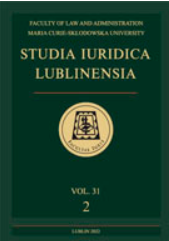Parliamentary Opposition and Democratic Transformation Issues – Central and Eastern Europe in Focus
Parliamentary Opposition and Democratic Transformation Issues – Central and Eastern Europe in Focus
Author(s): Vitalii Kovalchuk, Iryna SofinskaSubject(s): Politics / Political Sciences, Politics, Government/Political systems
Published by: Wydawnictwo Naukowe Uniwersytetu Marii Curie-Sklodowskiej
Keywords: parliamentary opposition; government-opposition relations; parliament; policy-making
Summary/Abstract: Parliamentary elections produce winners and losers. For understandable reasons, winners become the government (coalition) and losers – the opposition. The article presents a framework for comparing the rights in policy-making of the parliamentary opposition in parliamentary Central and Eastern European democracies (Czechia, Hungary, Lithuania, Poland, Ukraine). In 2022, democracy demands an opposition party with a future (reinversion) in parliament. The right of the parliamentary opposition to oppose the government formed by the governing majority is a fundamental feature of liberal democracy. Application of constitutional values (democracy, the rule of law, etc.) in Central and Eastern European states demonstrates the actual level of opposition fragmentation, polarization, and even cartelization. Rule of Law Index 2021 explicitly shows that among researched Central and Eastern European countries, Lithuania is in 18 place, Czechia – 22, Poland – 36, Hungary – 69, and Ukraine – 74. The Rule of Law Index is about constraints of government powers, absence of corruption, open government, and other issues related to the mission of the parliamentary opposition. Distance (not only ideological) between governing majority and parliamentary opposition is based on the capacity for government formation, participation in policy-making, scrutinizing governmental (populistic) strategy and policy.
Journal: Studia Iuridica Lublinensia
- Issue Year: 31/2022
- Issue No: 5
- Page Range: 219-231
- Page Count: 13
- Language: English

